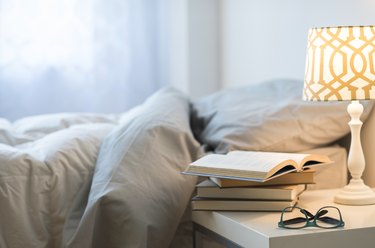
Good sleep is a cornerstone of mental health. So it might not come as a surprise that many therapists take their shut-eye pretty seriously.
"As I often tell my clients, when we protect our sleep, we give our brain a chance to reset and rejuvenate. A solid night of sleep will support your overall wellbeing in a way that nothing else can," says Carla Marie Manly, PhD, a clinical psychologist and author of Joy From Fear.
Video of the Day
Video of the Day
That's not to say that mental health pros don't sometimes have trouble winding down at night. After all, therapists experience feelings of stress and anxiety and have to manage massive to-do lists just like the rest of us.
The only difference? Many have go-to strategies for quieting the mental chatter at night to help them doze off more easily. Here, four therapists weigh in on what they do before bed to wind down — and share their advice for how you can do the same.
Steer Clear of the News or Triggering Media
If you want to watch a show before bed, pick something that's relaxing or soothing for you instead of something that riles you up. And maybe consider saving catching up on the news for tomorrow morning. Exposure to upsetting media can leave you anxious or stressed before bed and make it harder to fall asleep, Manly says.
That's why she tends to steer clear.
"Negative media interferes with sleep by upregulating the nervous system," Manly says. On the other hand, "when we protect ourselves from distressing information as much as possible in the evenings, we give our minds and our bodies a chance to downregulate and relax."
Bring a Book Into Bed
Joe Ricciardi, a licensed clinical social worker based in Los Angeles, has a habit of reading in bed before he falls asleep.
"For me, it's a reward of self-care that can remind me of how much vaster the world is and can be," Ricciardi says. "Getting lost in another world really clears my mind for peaceful sleep." He'll keep the reading sessions to 30 minutes or less so it doesn't cut into bedtime, but admits that sometimes he ends up nodding off after just a page or two.
Tip
The trick is picking a book that's engaging but not heart-pounding. "My personal tastes in reading skew towards biographies, history or short fiction," Ricciardi says. Before bed, he avoids mysteries, current events or crime stories that might leave him feeling riled up.
Imagine Your Brain Emptying Out
Guided imagery or visualization, where you intentionally generate a relaxing mental picture, can be a helpful way to de-stress and quiet racing thoughts before bed.
"A visualization works well for me when the image is familiar and just detailed enough to be interesting, and the process is a metaphor for what you need to accomplish — in this case, emptying your brain," says Elizabeth Young, PsyD, a licensed clinical psychologist in Rochester, New York.
While lying in bed, Young likes to picture her brain as an office full of cubicles, each with a worker and a light on. "I imagine it's 5 p.m. and each worker gathers their things, turns off the light, leaves the cubicle, walks down the corridor and takes the elevator down," she says. "The lights are thoughts and the elevator is the brain stem."
If any of Young's thoughts try to come back into her brain, "I picture a kindly security guard, who seeks out where the light is on, and gently reminds that worker that it's time to stop work and go home," she says. "That worker then goes through the procedure to leave."
Spray Your Pillow With Lavender
St. Louis, Missouri-based licensed psychologist Jameca Woody Cooper, PhD, spritzes a lavender linen spray on her pillows before bed to unwind. Partly, she does because lavender has a calming effect (thanks, aromatherapy!). "The scent helps to create an environment that will allow me to sleep and to relax in," she says. (Sipping a lavender tea might be calming too.)
But there's more to it. Because spraying the lavender is a nightly ritual, the activity signals to her brain that it's time to unwind. The key is spritzing with intention. Focusing on covering her pillows with the scent is an almost meditative opportunity to stop thinking about other things that might keep her awake.
Keep a Notepad on the Nightstand
Manly makes sure she always has a pen and paper on her nightstand to jot down thoughts that might set her mind racing while she's trying to nod off. "Sometimes a thought or two will pester me as I go to sleep. When I put them onto my write-off pad, my mind relaxes knowing that I won't forget to attend to the issue in the morning," she says.
Any kind of notebook or notepad will do the trick. Just try not to use the note app on your phone for those pre-bed brain dumps. The blue light from your phone's screen will only rouse your brain and make it harder to fall asleep, per the Centers for Disease Control and Prevention (CDC).
Was this article helpful?
150 Characters Max
0/150
Thank you for sharing!
Thank you for your feedback!
Is this an emergency? If you are experiencing serious medical symptoms, please see the National Library of Medicine’s list of signs you need emergency medical attention or call 911.





